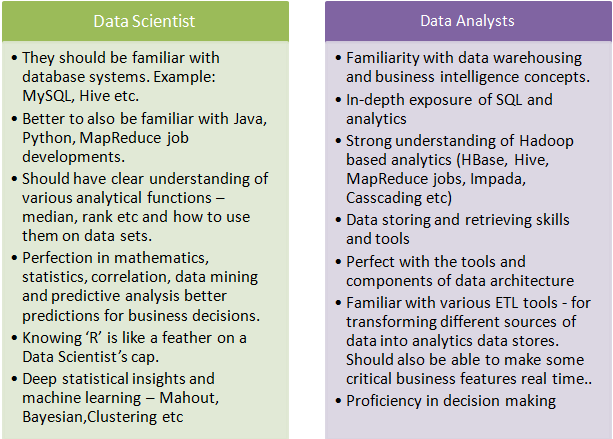Ready to learn Data Science? Browse courses like Data Science Training and Certification developed by industry thought leaders and Experfy in Harvard Innovation Lab.

In the world of exponential data growth, companies are turning to 2 jobs to solve some of their biggest problems, Data Analyst (or BI Engineer) and Data Science. However, it’s becoming more apparent that the business world is unsure how to appropriately define the scope and differentiate between these roles. It should come as no surprise though as Data Scientist has been listed as the #1 job in America, 3 years in a row. Analytics Manager comes in at #10. Data Science and Analytics have been around for quite a while now, but the roles were reserved for large companies, and primarily those that had lots of data (i.e Facebook, Google, GE, Investment Banks, etc.) These days nearly all companies are collecting data in some form and they don’t have the experts needed to comb through their data. Executives at these companies have most likely heard the buzz words of Data Scientist and Analytics, with only having a loose grasp of what these roles actually do.
If you take to the job boards these days, there are thousands of open jobs across the U.S. for both positions. More often that not you end up seeing job descriptions for a Data Scientist, that most closely define an Analyst role. The opposite is true as well, however it’s more rare.
Let’s set things straight and separate Data Scientist from Data Analyst.
Data Scientist, the true unicorn.
For those that haven’t heard this, it’s a common description for the role used in the field. A true data scientist possess these skills:
- STRONG — Business acumen
- STRONG — Math/Statistics
- STRONG — Computer Science/Ability to sling code
The unicorn is someone who’s perfect at all three. This is seldom the case. The most likely scenario is someone who lacks, or is weaker in one of the three.
Data Analyst, show me my business.
Data Analytics is very similar, they possess these skills:
- STRONG — Business acumen
- MODERATE — Math/Statistics
- MODERATE — Computer Science/Ability to sling code
As you can see, a Data Science requires a strong skill-set in all three categories. However, both roles require the same skills. The biggest difference is how they apply these skills. Let's clear up the misconception.
Data Scientist vs. Data Analytics Responsibilities
Data Scientist –
- EDA (Exploratory data analysis)
- Cleaning dirty data
- Identify trends in data using unsupervised machine learning
- Make predictions based on trends in the data using supervised machine learning
- Write code to assist in data exploration and analysis
- Provide code to technology/engineering to implement into products
Data Analyst –
- EDA (Exploratory data analysis)
- Cleaning dirty data
- Manage data warehousing and ETL (Extract Transform Load)
- Develop KPI’s to assess performance
- Develop visual representations of the data, through the use of BI platforms (i.e. Tableau, DOMO, Sisense, Looker, etc.)
Can you spot the biggest difference? Data Scientists use their strong statistical knowledge to create trend identification and make predictions about something. Their skills are required to truly understand elements within the data that can’t be identified by the naked eye. A Data Scientist tests multiple hypothesis on the data to determine whether a correlation, or trend in the data is random or significant, P value anyone? Data Analyst on the other hand must understand the data, cleanse it, and then provide a visual representation of the data to business decision makers.
Here are some other differences, mainly the tools required in each role

https://www.edureka.co/blog/difference-between-data-scientist-and-data-analyst/
I have found that in practice, many Data Analysts do not possess the skills required of their job. Data Analysts requires statistical knowledge (IMHO). Without this knowledge, KPI’s or visual data representations can be misstated and misguided. Correlation does not imply causation. This statement should be ingrained in memory for every person who is a Data Analyst. When hiring for Data Analysts, strive for candidates that have a good math or statistical background. It’s crucial.
I hope that this article has helped those in these fields currently, and those looking to hire for these positions. There are near identical skills required in both, but there is a key difference in what separates these roles. Businesses need to ensure they do not blur the lines.



